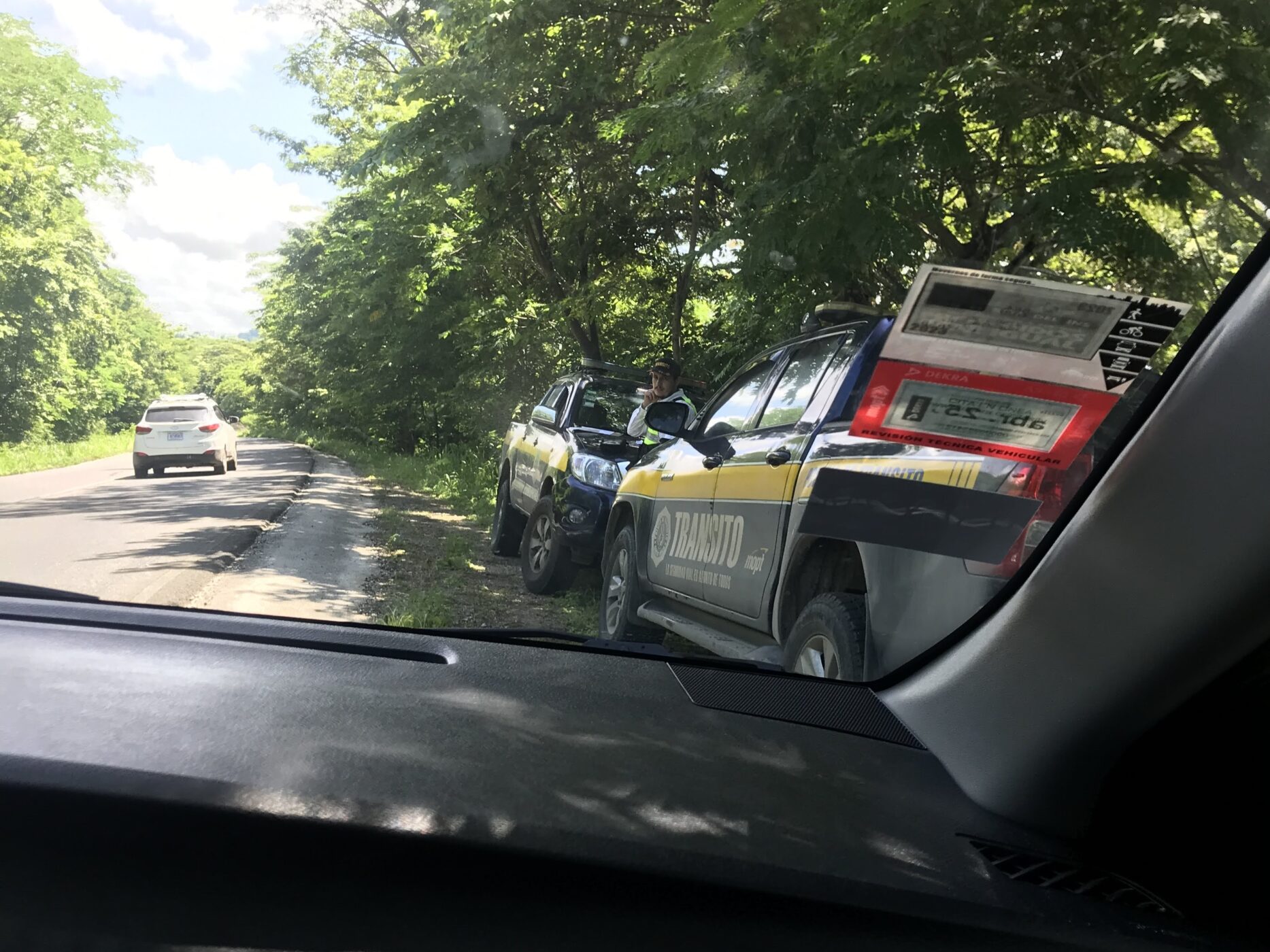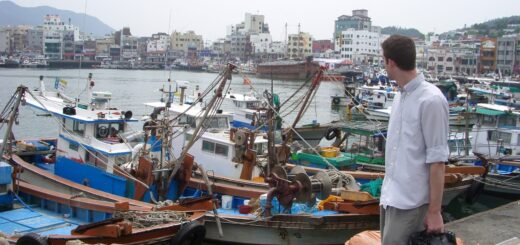Advice to Avoid Paying a Police Bribe in Latin America

After an encounter with corrupt police officers attempting to extort us in Ecuador, we reflect on the best way to handle this situation in the future.
Recently, we found ourselves in a worst-travel-fear situation. At a routine police checkpoint in the coastal region of Ecuador, we were told we would have to go to prison for worn tire treads. Then they told us they would let us go if we paid them a $900 fine on the spot. (You can read about it here.)
After the fact, we thought about what we did right — we did, after all, get away without paying anything — and what we wish we had done differently. This post is intended to share our insights.
I’m not sure how prevalent this issue is through Latin America. I’ve heard and read about this happening in Mexico. We traveled a whole year in seven countries in Latin America, mostly with rented cars, and passed through numerous police checkpoints. Typically, they ask to see your license and passport. They might ask you where you’re going or where you’re coming from. And that’s it. They let you continue on.
It wasn’t until our penultimate day in our final country in South America that the extortion incident occurred.
What Would I Do?
It’s not like I didn’t think this could happen. In fact, every time we’ve had to stop pull over at a checkpoint, I would silently shudder at how easy it would be for one of those cops to abuse their position.
And yet, I never thought about what I would do in a shake down. I wish I had.
That said, I won’t oversell this advice as easy or foolproof. This is not like “how to get your bread dough to rise every time.”
The situation is very tense, fluid, and depends on what kind of leverage the police have, which is usually a lot more than you. They have the authority, so it’s not like you can just wag a finger in the air and drive off. They may also be skilled con-men, bullying, manipulating, finding ways to corner you and flood your brain with urgent threats. It is a delicate balance of resisting police directives (like getting out of your car and into their vehicle) and not escalating the situation or doing something even worse they can cite you for.
Though every situation will pose different challenges, we have a better idea of what we’d do next time. These are our tips for dealing with police stops and checkpoints. Hopefully they will help readers to be more aware and guarded than we were in the same situation.
The Easy Stuff: Best Practices
1. Take a Photo of the Scene as You Arrive
This works best if you have an adult in the passenger seat. Take a picture as you pull up to a checkpoint. It might be useful to have as reference in case you want to report any shenanigans later. Also, take note of your surroundings. If it is a deserted area, be on high alert.
2. Have a Local Contact
Make sure you know who you would call in an emergency and have important numbers saved in your contacts. You don’t want to be looking up the number of your rental car agency on Google while your fingers are quaking and the cop is badgering you. In our case, calling the rental car agency is what saved us. But other trusted or official local contacts could work too. (Calling the police in Ecuador is the same as in the United States: 9-1-1.)
Also, this might go without saying, but make sure you can make a call from the road. We sometimes debate whether or not to get a local SIM card. Almost every establishment has WiFi and a lot of things like maps and driving directions work offline. But, unlikely as it might seem, there could come a day where a phone call from the road makes all the difference.
3. Do Not Get Out of the Car
Lock the doors and don’t get out. You are in the best position to negotiate in the safety of your car. If you get out, you risk being separated from whoever else is riding with you, and your means to get away, which gives them all the leverage.
4. Make Sure Your Documents are in the Front
I had to get out of the car because the cop asked for my passport and it was in my backpack in the trunk. Keep all documents up front in the glove compartment. However, squirreling away the bulk of your money in a backpack in the trunk is a great idea.
5. Show the Document, Don’t Hand It Over
If they ask for your license, take it out and show it to them — in your own hand. If they ask to take it, at least make them explain why. In my case, I would honestly tell them that I’d rather not because I was the victim of a scam.
Also, don’t try to make things too easy. I had been through so many checkpoints I already knew what they were going to ask for and I handed over a neat stack including my license and the car’s registration papers. Very dumb!
First, I shouldn’t have let anything leave my hands. Second, just let them ask you for each individual thing and show them (not give them) what they ask for. My sense is that if you look too eager to please, you make yourself a target.
The Harder Stuff: Resist, But Don’t Escalate
If they ask you to pay the fine in cash, on the spot, to them, it’s a scam. There is no place on earth that I’m aware of that traffic cops don’t have to write a ticket to issue a fine.
In some cases, the hustle might be a choice between a ticket or a “cash fine” for less than the amount. In our case, the choice was being taken to prison for 15 days while a stranger took my rental car and my family… or pay the cash fine.
Here you need to decide whether to try to resist or just pay the “fine.” In fact, you will need to assess that all along the way because the stakes will keep shifting. The way I saw it, there was a point where it would become untenable not to pay. I’m not going to get roughed up in the back of their pickup just to save some money. But until that became an imminent threat, we could resist, slow-walk, question, and try poking around for a soft spot in their seemingly solid scheme.
6. Don’t Do Anything Illegal
Just because they are shaking you down doesn’t greenlight doing something illegal. That would just hand the rogue cops more bullets to shoot you with.
Don’t offer a bribe. If the cops are threating some dire consequence for a minor infraction, don’t ask how much they’ll take to let you go. Be patient, they’ll get there on their own if that’s what they’re after.
Do not flee the scene. It’s too dangerous to get into a car chase, and now they’ll really have you on something serious. Moreover, you’ll never get away no matter how fast your car is. In Ecuador, a speed bump will sooner or later force you to a stop.
7. Ask Them to Write You a Ticket That You Can Pay at the Nearest Police Station
Police asking you to pay a fine on the spot are going to pocket that money. If they try this, ask them to write you a ticket that you can pay at the nearest police station.
You want to have documentation of the infraction and fine, and then confirm it is legitimate with a third party. Importantly, the police officer issuing the ticket should be named and identified on the ticket! If that information is not present it’s not a real ticket. This strategy allows you to “comply” with their penalty while biding you time to find a way out if the fine is indeed made up or exaggerated.
If they refuse to write a ticket, that is more confirmation that they are conning you.
7. Tell Them You Don’t Have That Much
Don’t be fooled. There is nothing magical about the cash amount they name. It’s just an opening bid. If you say you only have x, they’ll lower it if they think you’re telling the truth.
In our case, the cop said the fine was $900 that we had to pay on the spot. Liuan (unwisely) told him we only had $600. We actually didn’t have that much, and, why not say a much lower number!!! Next thing you know, the cop made a fake phone call to his fake supervisor and got clearance to lower it to $600.
8. Ask for the Officer’s Identification
This probably won’t work, but it will put them on the defensive. Assuming you’ve already asked them to write you a ticket and they’ve refused with some excuse about how it must be collected on the spot, ask to see their identification. At this stage, by the way, I’m still pretending like the cop is not asking for a bribe. You could say something like, “OK, before I pay the fine, I just want to verify that you are a proper police officer. Can I see your ID?”
Now, there is no way in hell they are going to do that, but it might throw them off balance having to explain why they can’t show their ID. You’re forcing them to show their cards.
9. Make a Phone Call
They’re probably going to discourage you from doing this, but do it anyway. Phone someone.
In our case, we called the rental agency. It made sense since we were no longer going to be able to return the car in time. The agent basically told us the police were full of crap — on speaker for the police to hear — and couldn’t legally do what they were threatening (detain foreigners).
They argued with the lady that they were following procedure, but now they new we had a local third-party with an interest in our fate. At the end of the call Liuan asked them to call the police. (The transit cops and the national police in Ecuador are separate.)
That phone call made all the difference. The police made a show of photographing my license to issue me a ticket later, and then got out of there quickly.
10. Get Photos and Note Your Location
Whether or not you ended up handing over the cash, you’ll probably feel shaken and have the urge to move on.
However, if you can remember to do so, take photos. Get their license plate. If you can, take pictures of the cops themselves. Also, note your location.
Then when you’re in a safe place, you can figure out what to do. File a police report. Post an alert to other travelers on Facebook. Put that jerk’s face on the internet.
Thoughts on “Playing Dumb Gringo”
I’ve heard and read the advice many times that the best thing to do when stopped by the police in Latin America is to play dumb and pretend you don’t know any Spanish (assuming you’re not a native Spanish speaker).
I see the logic in it. Make it laborious to get their point across and hopefully they’ll just give up and let you go. Maybe it’s as good a strategy as any.
Personally, I don’t plan on doing that. For one thing, lying makes me nervous. It would make it too hard to think about anything but keeping up the act. And I would assume, if they’re determined, they’ll find a way to get their point across. Plus, most encounters with the police are innocuous and it’s easier just to answer their questions so they’ll let you continue on your way. You won’t know at the outset if this is one of those rare instances where the cops are about to hustle you.
For me, having to remember to act dumb in certain situations seems impractical, and takes a lot of other options off the table — unless you really don’t know that much Spanish.
Details About the Incident
Our incident took place on the coast of Ecuador, between two small towns called Tosagua and Chone on Route 38. The officer’s name patch read, D. Silva. For what it’s worth, I’d recommend avoiding that stretch of highway.







In San Salvador soldiers stopped us for no fire extinguisher. I showed my military ID and said “after the battle all soldiers are brothers. ” they waved me on.